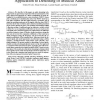Free Online Productivity Tools
i2Speak
i2Symbol
i2OCR
iTex2Img
iWeb2Print
iWeb2Shot
i2Type
iPdf2Split
iPdf2Merge
i2Bopomofo
i2Arabic
i2Style
i2Image
i2PDF
iLatex2Rtf
Sci2ools
114
click to vote
TASLP
2008
2008
Sparse Linear Regression With Structured Priors and Application to Denoising of Musical Audio
Abstract--We describe in this paper an audio denoising technique based on sparse linear regression with structured priors. The noisy signal is decomposed as a linear combination of atoms belonging to two modified discrete cosine transform (MDCT) bases, plus a residual part containing the noise. One MDCT basis has a long time resolution, and thus high frequency resolution, and is aimed at modeling tonal parts of the signal, while the other MDCT basis has short time resolution and is aimed at modeling transient parts (such as attacks of notes). The problem is formulated within a Bayesian setting. Conditional upon an indicator variable which is either 0 or 1, one expansion coefficient is set to zero or given a hierarchical prior. Structured priors are employed for the indicator variables; using two types of Markov chains, persistency along the time axis is favored for expansion coefficients of the tonal layer, while persistency along the frequency axis is favored for the expansion coeffic...
| Added | 15 Dec 2010 |
| Updated | 15 Dec 2010 |
| Type | Journal |
| Year | 2008 |
| Where | TASLP |
| Authors | Cédric Févotte, Bruno Torrésani, Laurent Daudet, Simon J. Godsill |
Comments (0)

